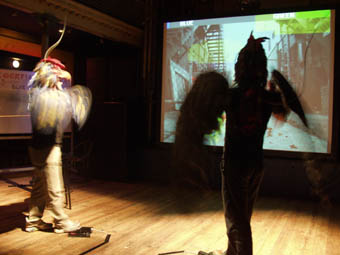 |
Cockfight Arena photo Matt Nettheim |
The other events in the gaming program were presented by C-Level, a Los Angeles-based “co-operative public and private lab formed to share physical, social and technological resources.” The C-Level performances were intimately concerned with the nature of game violence and audience participation in it, although their attitude towards the phenomenon was closer to relaxed indulgence than disapproval.
Cockfight Arena puts 2 players in chicken headdresses and wings, in front of a large screen on which 2 cocks are placed against a backdrop of urban decay. Flapping of the wings generates lift for the players’ avian avatars, while pedals by the players’ feet are used to lash out with the blades. The use of these costumes, and the physical activity of moving the wings, introduces an almost tribal, totemic feel to proceedings, as if players are invoking the behaviour they wish to see on screen by acting it out in person. The gameplay is similar to Joust, the 1982 Williams Electronics arcade hit, although the chickens are proportionally larger than the Williams ostrich/stork, which means the resulting flight patterns are quite different. Audience members are able to place bets on players, and smoking and drinking are encouraged, evoking the decadent feel of a real back-alley cockfight.
The second work presented by C-Level was Tekken Torture Tournament, an extension of the Playstation game Tekken 3 (Namco, 1998), and the result is, quite literally, shocking. Players have electrodes strapped to their right arms which deliver electric shocks as their on-screen alter ego is pummelled. The inability to move one’s button-pressing hand at various points during the game, due to its being clenched in momentary pain, changes the ebb and flow of the in-game violence. People fight differently when they actually feel pain, something worth remembering in this age of Nintendo wars.
Cockfight Arena and Tekken Torture Tournament reveal a desire to mix the real and the virtual, to raise the stakes for game players by commingling the world on-screen with physical actions and consequences. While the end results are not serious—losing a game does not mean losing your head, the fate suffered by your feathered friend in Cockfight Arena and the physical involvement definitely heightens your awareness of the game and makes the experience much more involving.
Both C-Level events were attended by a predominantly male audience. This could be due to the context in which they were exhibited; in a nightclub, rather than a gallery. Videos from previous performances in Los Angeles, Houston and Tel Aviv showed a more balanced gender mix. Questions during the C-Level forum revealed concerns from the local audience about the focus on violence. It could be that C-Level’s interest in gaming violence (and the choice of site) worked against the group.
The inclusion of C-Level and onedotzero in the AIFF broadens the program and explores cultural issues in a field that will become more important to filmmakers in future years. Multinational companies are developing content for film and games, and digital techniques are increasingly used in the creation of cinema. We can only hope that filmmakers and artists become more comfortable working within the peculiar constraints of computer gaming, and in doing so help move the field on from its technologically advanced but ethically and artistically stunted state.
Lensflare 02, onedotzero, www.onedotzero.com; Cockfight Arena, Tekken Torture Tournament, C-Level, http://c-level.org/, Computer Gaming Program, Adelaide International Film Festival, Church, The Nightclub, Adelaide, Mar 3-5
Ali Graham is an Adelaide-based programmer, writer, and game junkie.
RealTime issue #54 April-May 2003 pg. 24
© Ali Graham; for permission to reproduce apply to [email protected]








 back
back